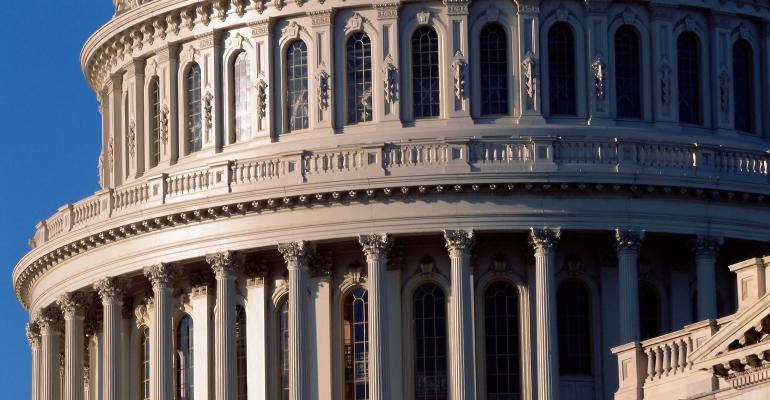As the financial services industry and the American public wait for the final results of Tuesday’s presidential election, an important question for regulatory watchers is whether Joe Biden, should he win the final tally, enters office with a unified or divided Congress.
If Republicans maintain control of the U.S. Senate, which looks exceedingly likely, it could forestall attempts to reverse last-minute Trump administration regulations related to the financial services sector and curtail chances to pass new legislation, partners at Faegre Drinker said during the webinar surveying the aftermath of Tuesday’s election.
“There are big picture consequences here that are not just about who’s in the White House and what they’d like to do, but what Congress they’re working with and what are they able to do,” Bradford Campbell, a partner with the firm, said.
Without control of both houses of Congress, Biden and congressional Democrats would be hard-pressed to overturn the recent DOL rule concerning ESG investing in retirement products, or the Department of Labor's rule, which, critics say, weakens fiduciary mandates for some investment recommendations in retirement accounts. Additionally, it would be a tall order for Democrats to move forward on any legislative agenda to pass a uniform fiduciary rule, according to James Lundy, a Faegre Drinker partner.
However, an incoming administration would have some tools at its disposal with the review process, namely, the process that allows Congress the opportunity to withdraw rules entered into the Federal Register within 60 days, meaning any finalized rules published after Nov. 20 could be overturned by a unified Congress. Democrats will miss the window on overturning the DOL’s rule on ESG in retirement plans, which has already passed. But the DOL’s fiduciary transaction exemption has yet to be sent from the Labor Department to the White House.
“If the DOL were to send a finalized version of the class exemption to the White House this week, it is a possibility it could be finished, reviewed and published before Nov. 20, before that rough deadline for how easy it would be for a Biden administration to stop the rule, but frankly, they’re effectively almost out of time to do that,” he said. “The fate of this rule, even if they do finish it, particularly hinges on who wins the presidential election.”
Technically, the DOL’s ESG rule no longer explicitly pertained to ESG investing, according to Campbell, who said that the department had excised the term from the finalized version of the rule after commenters noted the term was not clearly defined in the proposal. Instead, the rule mandates that fiduciaries can only focus on pecuniary (or financially material) factors when making investment decisions for clients, except for limited circumstances. But this offers a path for fiduciaries to integrate ESG risk analyses into investment decisions, provided their reasons for doing so are purely financially motivated, according to Campbell and Fred Reish, a Faegre Drinker partner.
“The DOL was basing its rule on a 20 or 30-year old concept of ESG, when it was done just to favor certain political or social beliefs, where now it’s being used by most investment managers I talk to in order to select investments likely to produce a better return in the future, or a comparable return, but at a lower risk,” Reish said.
Regardless of the election’s eventual victor, Lundy said the SEC was already preparing for a leadership change, with Chairman Jay Clayton planning to step down next year. When hypothesizing about the next chair (in either a Biden or Trump term), Lundy said he turned toward recent history, saying Presidents George W. Bush and Barack Obama both selected more moderate chairs in their first terms, followed by chairs in their second terms that leaned more to the right and left, respectively. Lundy expected the same after Clayton, with a second Trump term leading to a more pro-industry and partisan choice, while Biden would likely select a chair more aligned with investor protection.
Clayton has constantly stressed the SEC’s focus on “Main Street investors,” and Lundy said this trend was likely to continue regardless of who takes over as chair next year. In fact, Lundy asserted that Clayton’s pressing of the issue was preceded by Mary Jo White’s tenure as chair during Obama’s second term, when examinations and enforcement actions became more aggressive.
“That very much continued with Chair Clayton, and when you couple that with the Main Street initiative, the focus on the retail and retirement sector under Chair Clayton’s leadership, Reg BI and Form CRS, there are certain things that occur at the SEC that become embedded in the culture regardless of who the Chair is and who’s in the White House,” he said.
But despite the potential for a divided Congress, there were still some potential areas for bipartisan legislation, regardless of the occupant of the White House. Reish cited the “Securing a Strong Retirement Act of 2020,” which was introduced in the House in October and is viewed as a follow-up to the SECURE Act. Campbell noted that there is often a lot of bipartisan agreement on issues in the retirement space, and it’s one of the few areas where you could see forward movement, even in divided government.
“I think when you look at that, I think there’s a very good likelihood we will get additional significant changes to retirement plans from Congress regardless of who wins and who is controlling the Senate and the House, he said.
Currently, a number of states remain uncalled, including Pennsylvania, Georgia and Arizona. At the moment, it seems unlikely that the Democrats will take the U.S. Senate, having lost opportunities for pickups in states like Iowa and Maine (although it is exceedingly possible that both Senate seats in Georgia will be subject to runoff elections, which could put control of the Senate back into play).





